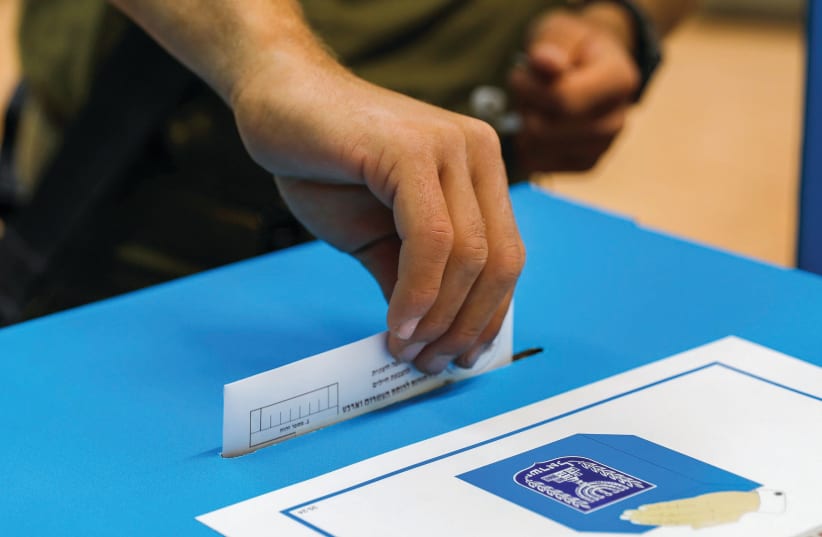After two postponements due to the ongoing war, municipal elections are set for Tuesday, February 27, in 241 cities and municipalities. Also due to the war, the upcoming local elections have garnered minimal media attention.
In the 14 locales whose residents were evacuated, elections will not be held.
“Because of the challenging circumstances, the municipal elections have undergone notable adjustments. For instance, men and women who are running for local government positions are currently serving in the IDF reserves or have family members who are still engaged on the battlefield, which makes it challenging for them to focus on their election campaigns,” explains Prof. Osnat Akirav, head of the Political Science Department at Western Galilee College.
“Even if we momentarily set aside the evacuated communities where elections cannot be held, how are soldiers stationed in Gaza supposed to vote? What would the logistics look like? Should we try to bring physical paper ballots to them inside the Gaza Strip? What we need are comprehensive logistics to facilitate voting for soldiers stationed in the Gaza envelope region.
“While it may present logistical challenges, it’s imperative that we ensure the inclusion of this segment of Israel’s population in the voting process. Failure to address this matter would lead to significant repercussions for many municipalities whose residents are currently serving in Gaza.”
Do you get the feeling that Israeli citizens are motivated to vote?
“I anticipate that voter turnout this time around will be even lower than usual due to diminished motivation among the populace,” Akirav explains. “Add to that the grim reality of numerous hostages still being held in Gaza; entire families are in mourning, and every day more soldiers are being killed. Overall, the prevailing mood is far from celebratory. While holding elections remains crucial for democracy, boosting voter participation will indeed demand innovative approaches.”
“THE SITUATION is very bleak,” says Prof. Itai Beeri, head of the Center for Public Management and Policy at the University of Haifa.
“On one hand, the issues that affect the public domain have shifted significantly. You can see this in the topics that are covered by the media, as well as in the conversations people are having with each other. A huge percentage of people’s exchanges revolve around IDF reservists, fallen soldiers, and the hostages who are still being held prisoner in Gaza. While other topics that were important before Oct. 7, such as education, transportation, infrastructure, leisure activities, and employment, are certainly no less important, they have now taken a back seat to the pressing matters of personal and national security, which have surged to the forefront of urgency.
“On the other hand,” according to Beeri, “the COVID epidemic and the Oct. 7 security crisis and evacuation of Israelis have emphasized the importance of local authorities. Local governance has proven to be the most effective, successful, and stable level of governance, much more so than the national government. In fact, it is the local authorities, not the national government, that have been managing the major crises. This is something we saw very clearly during Swords of Iron.
“In addition to the immense challenges that mayors whose residents were evacuated and scattered throughout the country faced, other cities welcomed hundreds, and sometimes tens of thousands, of evacuees overnight.
“Consider the case of Tiberias,” he notes, “which suddenly one morning found itself tasked with providing municipal services for tens of thousands of ‘new’ residents.
“While they may not have achieved the perfect arrangement, their accomplishments are nonetheless impressive given the circumstances. Even before funds allocated from the national government reached Tiberias and other cities in similar situations, it was clear that the local authorities were functioning at extremely high levels. The time has come to empower local authorities to act autonomously.
“What we have recently witnessed is a significant failure on the part of the central government, contrasted with the flourishing performance of local authorities. It’s high time to formally change the rules of engagement, mirroring the shifts that have occurred on the ground since Oct. 7.”
“WHEN IT comes to the conflict, newly elected municipal leaders will face numerous challenges upon assuming their roles,” says Edit Bar, CEO of the Bloomberg Sagol Center for City Leadership at Tel Aviv University.
“The initial hurdle will be to establish security preparedness across various scenarios, such as extended power outages, terrorist infiltrations, and other potential threats. If you examine these municipalities, you will see that the level of preparedness differs significantly among them. Each community has its own unique readiness level and specific requirements.”
“The prevailing crisis of trust within the populace towards the security establishment and the government inevitably spills over into people’s perception of local authorities as well,” says Liron Doron Levy, deputy CEO of the Center for Local Government. “Since Oct. 7, municipal emergency call centers, accustomed to handling approximately 300 calls per day, experienced an abrupt surge and are now inundated with over 5,000 calls. Amidst the crisis, heightened suspicion permeated every sound and encounter with unfamiliar faces. Local authorities have had to navigate these concerns with an abundance of patience, transparency, and inclusivity.
“This is something that is going to stay with us for several more years. It’s not clear when residents of towns that have been evacuated will be allowed to return home. Another issue is that some of them will be afraid to go home. I mean, we can’t really blame them. Why would Israelis who moved from Kiryat Shmona to Tel Aviv want to return home?
“If the government won’t invest in education, transportation, and healthcare and fails to address the problems in these cities, residents will not want to live in these towns. This crisis could impact every Israeli city. The 9/11 attacks in the US promoted a significant shift in Americans’ perception of security-related matters. It took years for Americans to regain confidence in the safety of air travel. Israeli citizens desire a visible local police presence on the streets, in parks, and throughout neighborhoods. However, implementing this requires financial resources. We must identify individuals who are committed to fulfilling this role with a strong sense of duty.
“In the coming years, I hope that local authorities won’t have to engage in conflict with the national government and that instead, the government will recognize local authorities as a force multiplier and empower them to act autonomously, particularly considering the events that occurred on Oct. 7.
“Local authorities have encountered numerous challenges, and they merit empowerment, as they are the front line responders during emergencies,” says Doron Levy.
Translated by Hannah Hochner.

